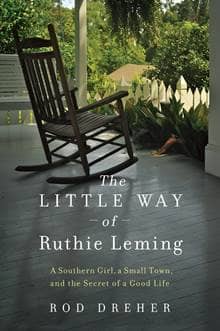
I longed for the diversity and excitement of the city. Ruthie loved country life, especially hunting, fishing, and being in the natural world. I couldn’t wait to cast off the thick and strong social bonds of our rural community, which held me back. When I was a teenager, I left home for good.
Ruthie stayed behind, married her high school sweetheart, and had three children. She and Mike built a house a stone’s throw away from where she and I had grown up, and she taught in the local public school, where we had all studied. Hers was a settled life. Mine was restless, moving from place to place, following my journalistic vocation.
And I did think it was a vocation. I never moved without praying about it, trying to discern God’s will for me – and later, for my wife and children. Still, I could see the cost of rootlessness. That was just how life had to be, I figured. Most people I knew were living like us.
When Ruthie was diagnosed with terminal cancer, the value of her roots in our town became clear. There was nothing Ruthie and her family wanted for. The entire community, it seemed, came out to help them. Neither Ruthie, nor Mike, nor their children, nor our parents, had to walk alone.
During this time, I came to see that the communal bonds that I once saw holding me back were the only things holding my suffering Louisiana family together. My wife and I, who lived in Philadelphia at the time, wondered what would happen to us if she or I were diagnosed with cancer. Yes, we had friends, but we had never lived in any one place long enough to put down the deep and broad roots in community that Ruthie had.
We felt naked and alone. After Ruthie died, and because of what her cancer revealed to us about the importance of community, we moved to my hometown, and started a new chapter in our lives.
St. Benedict of Nursia, the fifth-century holy man who helped start monasticism in Europe, taught that “stability” was one of the most important things in life. By that, he meant staying in one place, and learning to live within the discipline of place and community. The worst kind of monks, he said, are those he called “gyrovagues” -- those restless, tormented souls who flit from monastery to monastery, never happy, driven by passion, always takers and never givers.
To be sure, I don’t regret having left home as a teenager. God called me into the world, I believe, and I am grateful for what He showed me there. But he also called me back home, to help care for my aging parents, and to claim my roots after all these years of wandering.
Not everyone should stay in their hometown, or should return, even if they can. But shouldn’t we be more skeptical about the restlessness that we accept as a normal part of modern American life? Our culture tells us mobility is a sign of our freedom. But it can also be a trap that leads to spiritual starvation.
Ruthie’s life and death showed me the deep practical wisdom taught by the early Christian father Benedict: We need the discipline of stability in place, and in community, to become who God wants us to be.
Rod Dreher is a Beliefnet columnist and the author of The Little Way Of Ruthie Leming, which has just been published by Grand Central. Follow him on Twitter @roddreher, or connect with him at the Rod Dreher fan page on Facebook.

